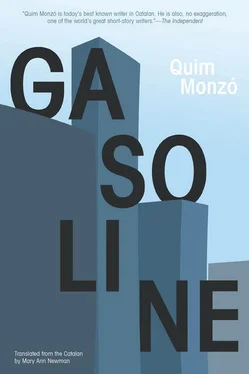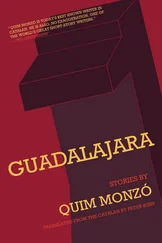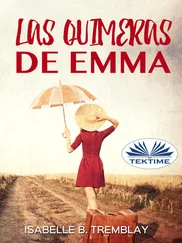Quim Monzó - Gasoline
Здесь есть возможность читать онлайн «Quim Monzó - Gasoline» весь текст электронной книги совершенно бесплатно (целиком полную версию без сокращений). В некоторых случаях можно слушать аудио, скачать через торрент в формате fb2 и присутствует краткое содержание. Год выпуска: 2010, Издательство: Open Letter, Жанр: Старинная литература, на английском языке. Описание произведения, (предисловие) а так же отзывы посетителей доступны на портале библиотеки ЛибКат.
- Название:Gasoline
- Автор:
- Издательство:Open Letter
- Жанр:
- Год:2010
- ISBN:нет данных
- Рейтинг книги:5 / 5. Голосов: 1
-
Избранное:Добавить в избранное
- Отзывы:
-
Ваша оценка:
- 100
- 1
- 2
- 3
- 4
- 5
Gasoline: краткое содержание, описание и аннотация
Предлагаем к чтению аннотацию, описание, краткое содержание или предисловие (зависит от того, что написал сам автор книги «Gasoline»). Если вы не нашли необходимую информацию о книге — напишите в комментариях, мы постараемся отыскать её.
Gasoline — читать онлайн бесплатно полную книгу (весь текст) целиком
Ниже представлен текст книги, разбитый по страницам. Система сохранения места последней прочитанной страницы, позволяет с удобством читать онлайн бесплатно книгу «Gasoline», без необходимости каждый раз заново искать на чём Вы остановились. Поставьте закладку, и сможете в любой момент перейти на страницу, на которой закончили чтение.
Интервал:
Закладка:
When Heribert gets up, the girl has already disappeared behind some bookcases. He searches all over the room for her and only discovers her when, from the handrail, he casts an eye over the main floor: she is at the cash register, paying, waiting for the cashier to put a paperback in a bag, and darting quick glances at the escalator.
Heribert finds it illogical to leave without a book. It isn’t exactly illogical: it is somehow suspect. Suspect? In what way? The question also seems stupid to him. To punish himself, as he runs toward the table of art books and picks up a copy of the one on Tamara de Lempicka, he pinches his left arm with the fingers of his right hand. He is still running (and feeling upon his skin the stares of all the salespeople and customers), when he goes down the escalator. For a moment it seems strange that no one thinks he has stolen anything, but by the following moment it seems evident that no one who had stolen anything would run; so it wasn’t even necessary for him to buy a book: breaking into a sprint was quite enough. As he puts on his coat after paying at one of the cash registers, he sees the girl far away, across the street, walking south.
He crosses the avenue (so suddenly that two taxis collide in order not to hit him) and follows her, quickening his pace until he’s close enough not to lose sight of her. Then he slows up. He is all set to approach her and say: “I’m terribly sorry. I’m not a guard at that bookstore. I know you decided not to steal the book on my account: when I looked at you, you must have thought it was a reproach, but it wasn’t at all.”
He watches her walking in front of him. He thinks she looks like an Anna and doesn’t feel like trying to figure out why he thinks her name should be Anna and not Judith or Cynthia. Maybe Anne or Ann, or perhaps Carmen or Barbara; not Mary, though. He doesn’t know why, but he’s sure a girl who walks like that can’t be a Mary.
He falls into step with her and walks right by her side. After a while, though, he reflects that he can’t address her without conveying an intention quite extraneous to the pure and simple message he wishes to deliver. From close up, her face seems familiar, and from more than one occasion. He sees it against a backdrop of paintings or sculptures. . At some exhibit? He starts to feel embarrassed, or shy, or scared, and he keeps looking at her, determined to say nothing even before her glance (surprised, both angry and frightened), makes him decide to diminish his speed, just as she accelerates. “Lately, I just seem to ruin everything,” he thinks. And, right after that, “It would have been more compelling to think ‘Lately, I just seem to ruin everything’ with tears in my eyes.”
•
He takes a quick look in all the rooms. As usual, Helena isn’t there. He thinks of preparing lunch, but at that point in the afternoon he decides it is more appropriate to skip lunch and prepare dinner. What, though? He opens the refrigerator and checks off the contents: ice cubes, a bottle of vodka, two bottles of white wine, butter, shrimp, chicken, beef, jams, several kinds of bread, tomatoes, string beans, corn, orange soda, grapefruit juice, tomato juice, sparkling water, onions, potatoes, olives, capers. The mere thought of figuring out what he could do with all that makes him dizzy. Perhaps only to avoid any more such musings, he decides that, precisely because it is so late, he can take advantage of these last moments of daylight: he goes up to his studio, prepares his paints, and turns on the radio. Without much enthusiasm, he continues filling in small strips of black on a canvas with a charcoal sketch of a man sitting on a stool with his head propped up on a bar.
Since this gets boring, he picks up the book he bought. He examines it, he touches it. He is so sure he’ll like it (both the book and every one of the plates, including the ones he’s never seen) that he puts off opening it. The longer he delays in opening the front cover and looking at the first page, the longer he puts off the pleasure of beginning to read it, the longer he will postpone the end. He also realizes that the sooner he begins to read it, the sooner he will finish it. (He quickly sees that this is just the same thing said backwards. For a moment he is surprised that one can say the same thing by saying it backwards. He perceives immediately that this is painfully obvious. Being surprised at self-evident things makes him feel corroded.)
For a while, he halfheartedly mulls over the thought that everything goes by (or everything has gone by him) too quickly in life. Then he wonders whether he isn’t putting off starting the book because, in fact, he’s not in the mood. Or is it this long line of thought he’s not in the mood for? More than a long line: an interminable line. He goes down to the living room. He turns on the television, goes to the kitchen, opens the refrigerator, takes out the bottle of vodka, pours himself a glass, goes back to the living room, sits down on the couch, and starts watching television. He remembers, though, that he hasn’t cleaned his brushes or turned off the radio. So he gets up, leaves the glass on the end table (and as he does it thinks that he ought to leave it on a coaster). Then it crosses his mind that he promised Hildegarda he would take her the record of the Dave Brubeck Quartet the next time they got together. He starts looking for it so he will know where it is when the time comes. One by one, he checks all the record covers, from the first to the last. Since he doesn’t come across it, he checks them all again, from the last to the first. When he’s done, he remembers that a few weeks ago Helena had lent it to Hipòlita. He sits down again in front of the television set just as a movie comes on. He is pleased to have arrived just in time.
Quite some time later, he realizes he doesn’t know what’s happening onscreen. He has seen the picture from the beginning, but now he wouldn’t be capable of explaining the plot. He decides to try: on the screen, two heterosexual couples (Heterosexual? he asks himself. Maybe it would be better to say of different sexes.) are arguing about he’s not sure what at a table in a restaurant. He uses the remote control to distort the colors: the people’s skin turns a reddish pink, like plastic, and the green of the tablecloth is practically fluorescent. It all seems so unreal, with that nervous drizzle that the color casts on actors and objects alike that, in the end, he feels better about it and is able to continue looking at the film without concerning himself with the plot or the actors’ gestures.
Two hours later his own snoring awakens him. He turns off the television and drags himself to bed.
•
He hears the rustling of sheets and asks himself if it is the rustling that has awakened him or if, a few moments before, he heard shoes hitting the floor, or if it’s just that, since he heard the rustling of sheets, he thinks he ought to have heard the sound of Helena undressing. Even if she folded her clothes carefully, shoes (in the quiet of the night) usually make noise when they hit the wood floor, and it is this sound that always awakens him. But what about earlier? Had he heard the floorboards creak under Helena’s feet? It worries him not to be able to tell exactly which sound has awakened him. It worries him that, little by little, he seems to be losing his previous auditory sensitivity; he used to have total awareness of the sounds around him, even when he was fast asleep, right down to the movements that had produced them.
His back feels cold. In a few minutes, Helena’s body, which is cold at the moment, will be warm, and it will be nice to turn over and put his arms around her, as if in his sleep. He thinks the scene would make a beautiful painting: a double bed, with a man sleeping on one edge and on the other a woman lifting the covers to get in. How would you know, though, whether she was lifting them to get in or out? This thought makes the image dissolve, and since he is absolutely certain he will not be able to retrieve it, he doesn’t even try. He continues to pretend to be sleeping, as if he weren’t aware that Helena had arrived. He opens one eye, and since from that position he can see neither the numbers nor the luminescent hands of the alarm clock on the night table, he shifts, as if he were dreaming, and (with his back still to Helena) positions his head in such a way that, by opening one eye, he can see the time: 4:15. He wonders whether to turn over and embrace her or wait for her to do it. Why is it that lately she doesn’t?
Читать дальшеИнтервал:
Закладка:
Похожие книги на «Gasoline»
Представляем Вашему вниманию похожие книги на «Gasoline» списком для выбора. Мы отобрали схожую по названию и смыслу литературу в надежде предоставить читателям больше вариантов отыскать новые, интересные, ещё непрочитанные произведения.
Обсуждение, отзывы о книге «Gasoline» и просто собственные мнения читателей. Оставьте ваши комментарии, напишите, что Вы думаете о произведении, его смысле или главных героях. Укажите что конкретно понравилось, а что нет, и почему Вы так считаете.












